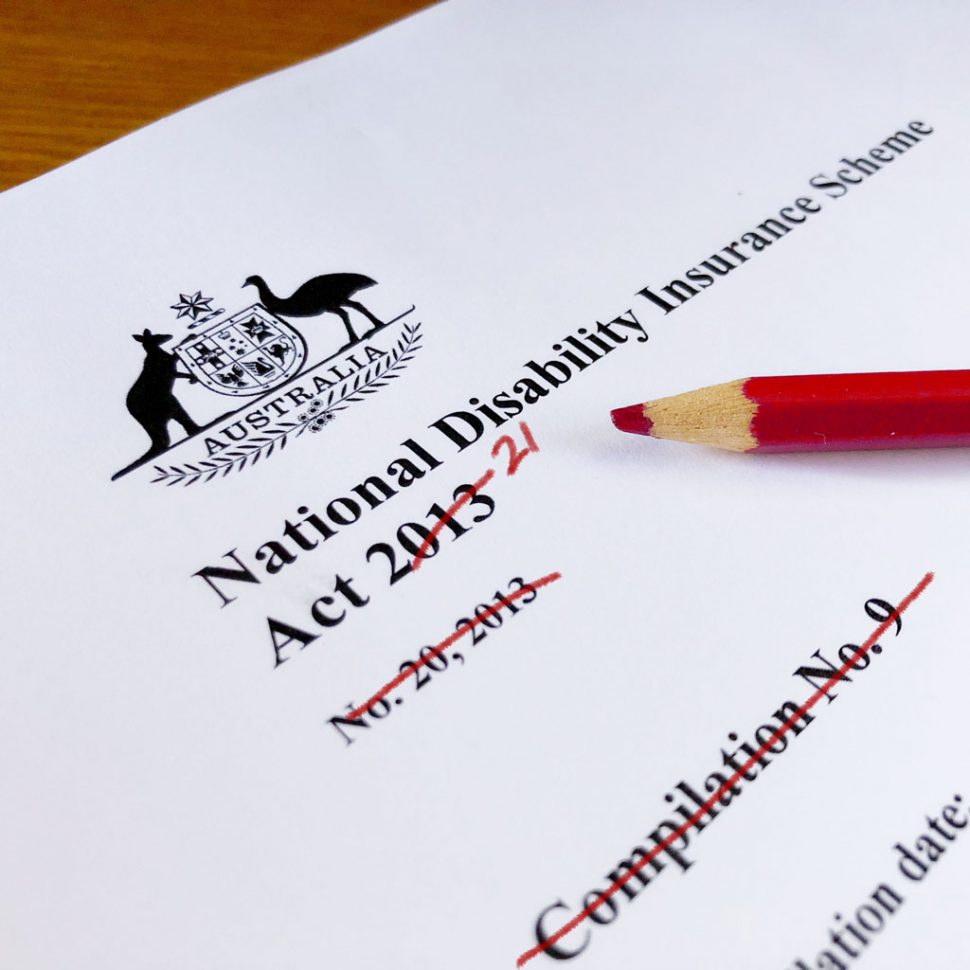Explainer part 3: New changes to the NDIS Act

On 30 March 2022 the National Disability Insurance Scheme Amendment (Participant Service Guarantee and Other Measures) Bill 2021 (Bill) was passed by Parliament. The Bill will amend the National Disability Insurance Scheme Act 2013 (NDIS Act).
In this Explainer, we aim to assist participants and advocates by summarising and analysing the major changes to the NDIS Act.
As set out in our previous Explainer, PIAC was concerned that the Bill would expand the NDIS Rules and the Minister’s rule-making powers for significant aspects of the NDIS, particularly in relation to varying plans. Changes to the Bill have addressed some of these concerns.
Giving effect to the Participant Service Guarantee
In 2019, the Australian Government committed to introduce a NDIS Participant Service Guarantee (Guarantee) to support a positive participant experience by:
- setting timeframes for decision-making by the NDIA; and
- establishing ‘engagement principles’ on how the NDIA will work with participants in delivering the NDIS.
The 2019 Tune Review made recommendations to improve the NDIS participant experience and support the Government’s commitment to legislate the Guarantee.
The Bill includes a number of changes intended to implement recommendations from the Tune Review and give effect to the Guarantee. These include:
- Inserting timeframes into the NDIS Act and Rules around decisions about access, participant plans and internal reviews. The timeframes are intended to improve the timeliness of decision-making and provide greater certainty for participants.
- Clarifying the language around the different types of ‘reviews’. The language for changes to plans will now be referred to as plan ‘variation’ (for less significant changes) or plan ‘reassessment’ (for more significant changes). The word ‘review’ is now exclusively used for formal internal reviews by the NDIA under s 99 of the NDIS Act and external reviews by the AAT.
- Requiring reasons to be provided for all ‘reviewable decisions’ (s 100(1)). ‘Reviewable decisions’ are decisions that are reviewable internally by the NDIA, such as a decision that a person is not eligible for the NDIS or a decision regarding the supports the NDIA will fund. Providing reasons is intended to improve transparency, accountability and the quality of decision-making. However, there is still no requirement for reasons to be provided once an internal review decision has been made.
- Expanding the Administrative Appeals Tribunal (AAT)’s jurisdiction to enable the AAT to review plans that have been varied or replaced by new plans during the course of proceedings. This will ensure the AAT can examine and decide upon the participant’s current circumstances.
- Improvements to the NDIS principles including embedding the principle of co-design with scheme participants and using more inclusive language such as removing moderating language (ie, ‘to the extent of their ability’) and amending ‘gender’ to include sex, gender identity, sexual orientation and intersex status.
- Annual reporting by the Commonwealth Ombudsman to review the NDIA’s performance against the Guarantee and in relation to participant experience. Oversight by the Commonwealth Ombudsman will assist to achieve a more transparent and accountable NDIA.
New power to ‘vary’ plans
The Tune Review recommended more flexibility for participants to request, and for the NDIA to make, changes to plans through plan ‘variation’.
The amended NDIS Act will allow participant plans to be varied without requiring a participant to go through a plan ‘reassessment’ process (s 47A).
A plan may be varied on the request of a participant or by the NDIA’s CEO. If on the CEO’s own initiative, they must consider certain matters when deciding whether to vary a participant’s plan (s 47A(6)). These matters require the agreement of the Commonwealth and each State and Territory and will be contained in NDIS Rules (Category A rules). This is a welcome change from the previous proposal which gave the Minister the power to decide these matters without the agreement of States and Territories (Category D rules).
The Bill initially proposed that the CEO could undertake a reassessment in response to a request by a participant for a variation of their plan. In a welcome development, the amended Bill removes the ability for the CEO to decide to take that course. This will ensure that plan variation and plan reassessment remain distinct concepts under the NDIS Act.
As recommended in the Tune Review, there will be limited circumstances in which plans may be varied under s 47A. These circumstances include:
- a variation to the reassessment date of the plan;
- a variation of the statement of participant supports included in the plan:
- in relation to plan management;
- if the statement specifies that a support is to be provided by a specific provider or in a specific manner and the variation is to change the specific provider or manner;
- if a participant requires crisis or emergency funding as a result of a significant change to their support needs and the CEO is satisfied that the support is reasonable and necessary;
- if on request of the NDIA in relation to a particular support, a participant has obtained information, such as assessments or quotes, and upon receipt of the information the CEO is satisfied that funding the support is reasonable and necessary;
- to deal with a change to the reassessment date of the plan; or
- a minor variation that leads to an increase in funding; or
- to correct a minor or technical error in the plan.
The inclusion of these circumstances in the NDIS Act rather than in NDIS Rules reflects stakeholder feedback that the circumstances in which plans are varied should be certain, clear and confined within the primary legislation.
Eligibility for the NDIS
Clarifying the ‘permanence’ criteria
The amendments provide clarity about the ‘permanence’ criteria (sections 24(3) and 25(1A) of the NDIS Act). Now, all impairments which are episodic or fluctuating in nature may be taken to be permanent, regardless of whether the impairment is attributable to a psychosocial or non-psychosocial disability. This is a positive clarification, and reflects recommendations from the Tune Review.
The Minister will not have a new rule-making power
The Bill had initially proposed to grant the Minister power to make rules about the ‘requirements’ that must be satisfied for an impairment to be considered permanent, or for substantially reduced functional capacity.
Adding new ‘requirements’ would introduce more rules that must be met before an impairment is considered ‘permanent’. PIAC was concerned that changes to eligibility thresholds, given their significance, should be in the NDIS Act rather than in Rules.
Ultimately, this proposed rule-making power was removed from the Bill. We are pleased that the role of Parliament has been maintained in determining who can access the NDIS.
New process for plan management and payment of supports
There are four ways participants can choose to manage their supports:
- self-manage;
- ask someone else to do it for them (a plan nominee);
- use a plan management provider; or
- NDIA managed.
A request for funding to be self-managed or managed by a plan nominee requires the CEO to be satisfied that management of the plan in this way does not create an ‘unreasonable risk’ to the participant. This is not currently required for participants requesting their plan to be managed by a plan management provider.
Now, amendments to sections 43 and 44 of the NDIS Act will extend the risk assessment process to participants who request to have their funding plan managed by a plan management provider.
This change is to acknowledge that there may be similar risks in engaging an unregistered provider to deliver NDIS supports, even where the provider is engaged through a plan manager. This change reflects recommendations in the Tune Review and is intended to accommodate participants’ choice for how they wish their plan to be managed. However, to the extent that there is an ‘unreasonable risk’, funding is to be managed by the NDIA to that same extent. There remain concerns that these changes will limit the choice and control of participants to manage their supports, so we hope to see consultation around reforms to the Plan Management Rules in the future.
Additionally, the NDIA will now be able to pay service providers directly on behalf of participants, through a new payment platform (s 45). The new payment platform is intended to simplify the payment process for both participants and the NDIA. This means participants will no longer be required to pay for supports from their own funds before claiming a reimbursement. Although the drafting of this section is not clear, the Government’s explanatory memorandum clarifies that this change is not intended to remove the ability for self-managed participants to continue their existing payment method.
Other notable changes
Other welcome changes include:
- The NDIA will be able to provide funding to an entity to assist participants to fully access supports or services (s 14(2)). This is intended to mitigate the impact of market challenges, particularly in areas where supports or services are not readily available. The matters which the NDIA must consider in deciding whether to provide such discretionary funding may be set out in NDIS Rules (s 14(3)). These rules will be designated Category A (s 209(8)).
- The circumstances in which the CEO may undertake reassessments on their own initiative will be set out in NDIS Rules (s 48(5)). This is intended to ensure consistency in decision-making about whether to reassess a plan. These rules will be designated as Category A (s 209(8)), which is appropriate given the circumstances in which the CEO may undertake reassessments are significant policy matters.
We want to give a big thank you to Erin and everyone at the Public Interest Advocacy Centre (PIAC) for allowing us to republish this explainer, which first appeared on the PIAC website here.


Join the conversation